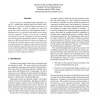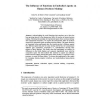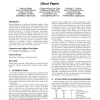45 search results - page 7 / 9 » Uncertainty in iterated cooperation games |
106
click to vote
ECAI
2006
Springer
15 years 4 months ago
2006
Springer
Abstract. Computational Game Theory is a way to study and evaluate behaviors using game theory models, via agent-based computer simulations. One of the most known example of this a...
103
Voted
ICMAS
1998
15 years 1 months ago
1998
This work presents a lookahead-based exploration strategy for a model-based learning agent that enables exploration of the opponent's behavior during interaction in a multi-a...
111
click to vote
IPPS
2007
IEEE
15 years 6 months ago
2007
IEEE
In this paper we address the problem of selfish behavior in ad hoc networks. We propose a strategy driven approach which aims at enforcing cooperation between network participant...
121
Voted
IVA
2010
Springer
14 years 11 months ago
2010
Springer
Acknowledging the social functions that emotions serve, there has been growing interest in the interpersonal effect of emotion in human decision making. Following the paradigm of e...
99
Voted
ATAL
2008
Springer
15 years 2 months ago
2008
Springer
Reward shaping is a well-known technique applied to help reinforcement-learning agents converge more quickly to nearoptimal behavior. In this paper, we introduce social reward sha...



